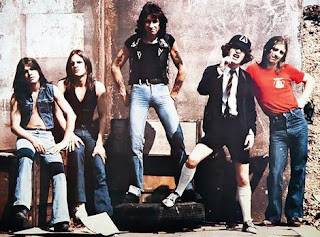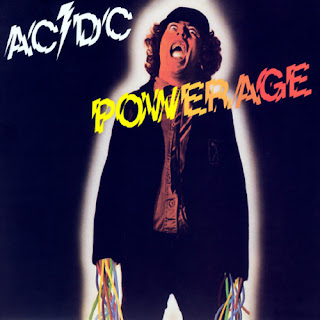"Happy Birthday"
Bon Scott...
Today would have marked the 66th birthday of Bon Scott, the original lead singer of the Australian hard rock group AC/DC. Scott, who was their front man during the first wave of the band’s success, died of acute alcohol poisoning on February 19th, 1980, and was another of rock’s true blue go for broke and take no prisoners individual, who relished and leapt full frontally into all the swirling decadence that came with his endeavor. With his gritty voice and attitude, his ballsy approach on the microphone, his charmingly sleazy demeanor, and dying young like so many of rock and roll’s greats before him, Bon Scott remains a celebrated figure in the annals of hard rock history.
He was born Ronald Belford Scott in Scotland on July 9, 1946, before his family moved him from there to Australia when he was six. Having recently arrived from Bonnie, Scotland at that point when he went to school, he was christened with the nickname “Bon” and it stuck with him for the rest of his life.
(Bon Scott in the lap of his mother Isabelle (Isa) Cunningham Mitchell, along with her husband, Charles (Chick) Scott, in the background.)
He worked various jobs when he was a teenager, picking up the drums eventually and forming the band The Spektors when he was 12, playing the backbeat and also occasionally singing. His distinctive vocal sound was influenced by the great Little Richard, who also had a propensity for wailing and screeching lyrics, almost in a guttural sense onto his recordings. Scott played in various other bands throughout the 1960s and into the 1970s, some of them sporting minor hit singles in Australia. He also started to relish his party lifestyle and manifested it as the days went by more and more. By 1974, Scott had gotten into a major drunken altercation with a band member, took off on a motorcycle and crashed it, suffering injuries so severe he was in a coma for three days. A man with the colorful name of Vince Lovegrove gave Scott odd jobs to do during his recovery from the accident, and he also ran a management/booking agency. It was Lovegrove who introduced Scott to AC/DC, who needed a new singer as the original singer, Dave Evans, had departed due to irreconcilable differences between him and the rest of the group.
(AC/DC with Lead Singer Dave Evans, 1974)
(Dave Evans)
At first glance of the suggestion, the band, led by the Young brothers, George, Malcolm, and Angus, thought Scott was too old and didn't think his injuries would make him a capable, viable front man for the heavy rock ensemble. Scott defense was that he didn't think the band was old enough and could rock out at all. A quick get together soon afterward in the guise of a jam session that lasted until the break of dawn proved otherwise, and thus, the first classic lineup of AC/DC was in place.
The first album with Scott as the front man, High Voltage, released October 1974, took only ten days to record. Scott added lyrics to what were mainly instrumental tunes that had been written by the Young brothers.

By the following year, their second album, TNT included what is essentially the first in a long string of AC/DC rock anthems, “It’s A Long Way to the Top (If You Wanna Rock and Roll).” At the time the album was only released in Australia and New Zealand, and they slowly built a fan base that was cultivated by appearances on a nationally broadcast music program called Countdown, which spring-boarded AC/DC into becoming one of the biggest acts down under. In 1976, they signed with Atlantic Records for an international distribution deal, and toured non-stop all over Europe, supporting seminal rock acts at the time such as Black Sabbath, Kiss, Aerosmith, Blue Oyster Cult, and others.
The first two albums that were released in Australia were repackaged as one album, also entitled High Voltage, and sold over 3 million copies to date, and the band started its slow domination of the globe.
The next release, Dirty Deeds Done Dirt Cheap, with its crunching metal sing-a-long feel of the title track and the song “Big Balls” which parlayed a rather tongue in cheek innuendo done to a delicious and positively perfectly slimy albeit top notch turn by way of Scott’s vocalizing, was another standout. The record was also successful and remains another of the band’s high watermarks of their career and extensive catalog.
The next release, entitled Let There Be Rock, came out in 1977, during which time the band played America for the first time, supporting a reunited MC5 in Flint, Michigan, and performing a few songs.
The following year’s Powerage started to set the tone AC/DC is well known for, as their riffs became more harder and the record more leaner, Scott’s confident vocals still the primary showcase for the band and perfectly complementing the jackhammer sound of the music. A single from the album, “Rock and Roll Damnation,” hit number #24 on the charts, giving the band a surprise and unexpected hit.
But it was the release of Highway to Hell in 1979 that made AC/DC poised for the superstar status they would achieve in the wake of Bon Scott’s death that following year. It also marked the band’s first real breakthrough in America, as the album reached the top 20 on the album charts. Produced by Robert “Mutt” Lange, who became a seminal force for the band and a large influence in their change of direction, Highway to Hell found the band tighter and rocking harder this time around, retaining their core signature sound, but even found Scott more focused and less grimy in his approach, which while successful on the prior AC/DC releases, was decidedly more popular to a cult fringe of the band’s audience. With Highway to Hell, AC/DC was risen to a higher level in the eyes and ears of their hard rock compatriots and audience respectively.
By 1980, the band had already started working on the next album, Back in Black. But on February 19, 1980, Scott had passed out in a friend’s car after a heavy night of drinking and died. The first chapter of AC/DC had come to an abrupt close. The band considered quitting but they soldiered on to complete Back in Black, employing a new singer by the name of Brian Johnson, who they knew from of all people, Bon Scott. Bon had touted Johnson to the band, saying he had a vocal style and range which sounded like, one of his earliest heroes, the one he tried to emulate the most growing up, Little Richard.
Back in Black, released near the end of the year, became one of the biggest-selling records of all time, became regarded as one of rock and roll’s greatest most influential releases, and the band found themselves enjoying the superstar status that was right on the cusp with Bon Scott. The band continues to this day selling out arenas all over the world and AC/DC remains one of rock and roll’s most legendary music ensembles to millions of fans globally.
But Bon Scott has not been forgotten by any means. He still gets plenty of radio play on classic rock radio, as “Highway to Hell,” “Dirty Deeds Done Dirt Cheap,” “TNT,” and “It’s a Long Way to the Top” still get heavy rotation on the airwaves. New generations of fans still are discovering the fact that the Bon Scott era of AC/DC still packs a leather-studded glove wallop to the musical chest as much as the more mainstream later Brian Johnson-era AC/DC records do. Fans who have been there since the beginning, still consider Bon Scott as one of the greatest hard rock front men of all time. Critics’ polls in various music and metal magazines still put Scott in their “top ten greatest rock singers of all time” lists. It’s a testament to the legacy of Bon Scott that generations of AC/DC fans still keep his name and attitude alive and well into this 21 century. Birthday greetings of the highest order to Bon Scott, the man who really was TNT, he was dynamite.
-Geeksofdoom.com














.jpg)














.jpg)












.jpg)

No comments:
Post a Comment